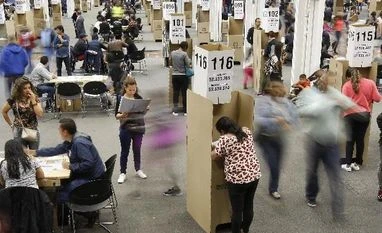A dismal showing by Colombia's left-wing Decencia coalition in legislative voting could bode poorly for its candidate, Gustavo Petro, in a looming presidential election, while in party primaries right-wing rival Ivan Duque scored a more emphatic victory.
The outcome of the lower house and Senate elections and primaries for left and right-wing parties, all held on Sunday, were keenly watched as the deeply polarised Andean country heads towards an election set for May 27.
Investors have been uneasy over possibility of Petro, a former member of the disbanded M-19 guerrilla group and ex-mayor of Bogota, winning the presidency as he has been running neck and neck with Duque in opinion polls.
But in Sunday's legislative elections, Petro's Decencia won just 1.7 percent of the vote in the lower house and 3.4 percent in the Senate.
Colombian left-wingers advocate investment in education, as well as strong support for a recent peace deal with Marxist rebels, to combat profound inequality. And investors have been wary of Petro's promise to create a "social economy" that would shift away from oil, Colombia's top export, toward agriculture.
Petro, whose coalition does not represent all of the country's left-wing parties, had a far less emphatic primary victory than Duque, polling 40 percent fewer votes to secure the candidacy for his coalition.
More than 6 million votes were cast in the three-way right-wing primary and 3.5 million in the two-way left-wing contest. Some voters will have voted strategically and may not back either winner in the presidential vote.
More From This Section
Duque, a protege of former president Alvaro Uribe, backs foreign investment and an aggressive security strategy meant to combat the country's remaining rebel group, which regularly bombs oil pipelines.
While no party came close to winning control of either the lower house or Senate, with results still not finalized early on Monday, Duque's Democratic Center party was polling the largest number of votes for the Senate, with more than 2.5 million, and was running second in votes for the lower house.
Right-wing politicians have pointed at the troubles of neighboring Venezuela to raise fears that a left wing victory could lead to economic collapse.
"We do not want the temptations of the populist authoritarianism that ruined Venezuela to come to our country," Duque told supporters as the results began filtering through.
Duque and Petro are not the only candidates running for the presidency.
Sergio Fajardo, a former mayor of Medellin, and ex-vice president German Vargas Lleras have both entered the field without having had to contest inter-party primaries.
They both favor improvements to infrastructure and tax cuts for businesses, though Fajardo is considered left-leaning.
Duque and Vargas Lleras, from the Radical Change party, have strong party machines behind them and can count on backing in Congress should either of them win the presidency.
The two parties in Fajardo's coalition won just under 9 percent of votes in the lower house and 13 percent in the Senate.
)